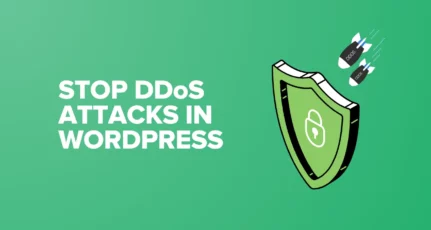
When considering important aspects of the SEO of any site, the permalink plays a major role in overall optimization. A permalink is a permanent link of your page and posts, and it doesn’t change with time. By default, WordPress offers permalinks like this:
https://www.shoutmeloud.com/?p=123
This type of permalink is not Search Engine friendly, so most newbie bloggers just starting with WordPress fail to create a site that is optimizing WordPress permalinks for SEO because they are using the default permalinks.
In this guide, I will teach you which permalink structure is the best, and I will also look into other suggested WordPress permalink structures and why you should avoid them.
Which permalink structure is recommended for optimal SEO?
One of the major on-page SEO factors is having your keyword in your post URL (permalink). As I’ve just discussed, the default WordPress permalink is not SEO-friendly, so when you install WordPress for the first time and start blogging without making a change to that default, you are blogging with a permalink structure that is not SEO friendly.
As previously mentioned in my WordPress essential settings guide, your permalink is the first thing you should change when setting up your blog for the first time.

You can find various permalink settings under WordPress dashboard > Settings > Permalink. A few suggested permalink structures are:
- Domain.com/Category/Post-name
- Domain.com/Postname (/%postname%/)
- Domain.com/postname/numeric-ID
My favorite and suggested permalink structure for a WordPress blog is Post Name. Post name permalinks are short, sweet and have nothing extra which will affect your on- page SEO score.
Many bloggers recommend using Category in a permalink which is also fine, but only when your category name is short and meaningful, and you are not using multiple categories/posts. I’m not a big fan of using Category in permalink structure, because depending on your indexing settings, it may lead to duplicate content on your WordPress blog.
Another permalink method which I highly recommend avoiding is that of using dates in your permalink. This takes away your capability of republishing your post at later date. The permalink remains the same, but when you republish the post, it does not make sense because you will still be using the old date in the permalink.
WordPress Permalink for Google News:
If you are running a news-based site such as a site having a focus on current affairs, Bollywood or Hollywood news, technology news, etc., you need to have a three-digit unique ID in your permalink as mentioned in the Google news submission requirement.
/%postname%-%post_id%/
Some time back, Matt Cutts, a Google engineer also changed his WordPress blog permalink structure to domain.com/post-name and here is an explanation from him:
He didn’t mention anything directly related to the SEO benefits of using a simple WordPress permalink, but he did mention the fact that such a permalink helps to keep things simple.
Read: How To Write SEO Friendly Content
Take-away and other permalink SEO tips:
- Use simple permalinks (domain.com/postname)
- Prefer dashes over underscores (Source)
- Remove stop words from permalinks (such as “is” or “are)
- Never change permalinks after publishing, and if you do so for some reason set up a 301 redirection from the old URL to the new URL using .htaccess
- Use your keyword in your permalink
A couple of months back I changed the permalink structure of an existing site and made sure it was a 301 redirection, but somehow after changing the permalink structure my site traffic was affected. So, if you have a huge site I recommend that you avoid changing your permalinks unless it is completely unavoidable.
You can refer to this guide for a discussion of how I changed the permalink structure for an existing site.
Another big debate regarding permalinks is using : www or non- www in the URL of your domain.
I used to prefer www in my permalinks, but since the rest of the world is going to the short and simple version, I prefer using non- www in my site name (meaning I simply do not use the “www” portion of the former URL). This gives you more space in the permalink, and with search engine indices only allowing 66 characters in a permalink, the three fewer characters can be helpful as well.
If you choose the non-www version of domain structure, make sure the www version of your site is properly redirected to the non-www version to avoid a WordPress duplicate issue.
Example: http://www.wphostingdiscount.com —- >> http://wphostingdiscount.com
I also recommend that you set your preferred domain from your Webmaster tool. You can learn more about this in my previous post on: Google Webmaster tool preferred domain settings.
From now on, whenever you are setting up a new WordPress blog, make sure you use an SEO-friendly WordPress permalink structure rather than any random permalink.
If you have any questions regarding WordPress permalinks, let us know via the comments section below.
If you enjoyed reading this article, feel free to share it on Facebook, Twitter and Google Plus, and don’t forget to check my WordPress guide for more WordPress tips.






I strongly believe that post type is the best practice for proper SEO Optimization. I have being using it alot and i have seen improvement in search engine prior to the keywords being targeted ..Thanks for this elegant article.!
Hi Harsh,
Excellent post! For me, it would always be %postname%. I been using this same format for a long time and seems pretty cool. Moreover, it makes the link look shorter (without the category).
Thanks for sharing mate~
Reginald.
Hi Harsh, nice post, saved a lot of time. Just want to know about the non www and www version. I am quite confused at that. If suppose I need non www version, how exactly can I redirect my www version to non www version. Can you send me the link to the tutorial for that so explain me the process. Thanks
Google News and Yahoo I think want to have dates for the permalink… so I think it depends on what do you want to target
I have been using WordPress for 6 months.. I am using Numeric ID permalinks… Will it affect my SEO in near future? or I should changed it %postname%?
Must reply… Thanks
has anyone switched from an html site where you go from pages.html to wordpress permalinks? do people typically setup 301 redirects for all their html pages or convert their permalinks to html so there is no need for redirects?
A very great post Harsh.Can making of this permalink works with the low end mobile phones ? All I’ve learned regarding url, is simply copying and pasting an available url.Doing so enables me to post anything via sms ,email,BBO to fb., twitter or elsewhere. I would hope to take a close look on both hyperlinks and permalinks creation.THANKS
Really awesome and detialed review regarding permalinks. Yes no doubt “post name” permalink is a lot better and easier to remember. Thanks !
To me using categories is essential for SEO after Google Penguin Update. I would recommend all my fellow bloggers to be careful when creating meta tags and make sure the targeted keyword appears somewhere in the beginning of the permalink as Google now matches title and permalink structure to return a user with relevant results.
George Lee, I am going to tend to agree with you. I like the idea of adding categories to the permalink structure eespecially since I only use ONE category for each post. My categories are keywords like “wordpress-tutorials” and “thesis-tutorials” so I would tend to think that would help my SEO when my site is crawled.
P.S. Harsh, great article, and excellent resources eespecially the video of Matt Cutts!
I found that all Facebook share link will become error 404 after change permalink link, seem nothing can do of this.
@Techgravy
There is a way but it requires little bit of coding…If you wish to save your Social media counts…
http://encosia.com/preserving-social-sharing-counters-through-a-url-change/
And if you talking about 404 for earlier shared link, it should not happen as we are doing a 301 Perma-redirection.
Hi Harsh , I heard some where that google loves .html pages , should we use /%postname%.html or only postname ??
I also believe that %postname% is the best permalink structure you can go for, I have used it on 20+ blogs. 🙂
but i have migrated my blog from blogger – so my permalink structure is /%year%/%monthnum%/%postname%.html any solutions ?
@Technikant
Same as I explained in this article: http://wpfreesetup.com/86/how-to-change-wordpress-permalink-with-301-perma-redirection/
You need to take care of 301 Perma-redirection and use Broken link checker to fix all internal redirection…
I’m using %postname% in my blog’s URL since I have read it’s benefit in your blog’s articles. My blog’s success credit goes & only goes to SML.
Glad to know that Irfan..
You might like to check this out: http://www.facebook.com/Shoutmeloud/posts/10151109734926675
why post id and why not date for news website
@Ved Refer to first comment and you will realize why dates are not suggested.
Hi,
Looks interesting to me, however, I’ve been running a blog since 2007 and have the permalink in the form of / YEAR/MONTH/POST NAME, changing to only /POST NAME will it affect the SEO of my Blog ?
What will happen to the earlier links indexed in google and will I need to rework on my sitemap.xml files and on my webmaster ?
Thanks
Sunith
@Sunith
You need to implement 301 redirection for all such old links..!!
Yes, SEO will be affected a little, atleast I have noticed it in my case…
You don’t have to worry much about sitemap..You can simply regenerate sitemap and submit it..!!
Also use broken link checker plugin and fix the redirection of interlinked post..
You can refer to this guide: http://wpfreesetup.com/86/how-to-change-wordpress-permalink-with-301-perma-redirection/
Also make sure to take a database backup before making this change.
%postname% is the best permalink structure. Earlier I used to prefer %postname%.html, but , the former one is shorter.
Good advice on using permalink , I have used .html the end of %postname% so it look like a simple html file , I had some old pages but didn’t change the .htacces file for redirect instead i Used redirect plugin for implementing 301 redirection to new pages. Its very easy when you have large number of pages to be redirected.
@Prabir
I tried redirection plugin almost year back and it’s powerful and does the job pretty well.. Though the only reason I prefer .htaccess method coz, redirection plugin increases the size of database by a lot..
You can check that and confirm me for the same by using wp db manager plugin… Hope they have made some changes now.!!
I also use %postname% in the url structure. Its not only good for SEO but also makes us easy to remember the url.
I agree as well on using the Postname as the permalink. In my experience with reading content that has permalinks with date is that if the content is published about 2 years back, I will not completely take the advice from the post simply because I believe there is a better and newer content out there. As a result, keeping the date away is a good way to give reader the impression that the post is not outdated. After all, there are posts that hardly gets outdated such as Tutorials, How to and fundamental tips.
@Alan I agree with your statement on using dates..As it outdate content even after a month…It’s same as showing date’s in SERP’s …When your evergreen content is outdated because of presence of dates…